I didn't like the idea from the beginning. But my friend Max kept phoning. He
had arranged for us to be invited to a wild boar hunt on the following Friday.
The invitation had come about because of an earlier Village Letter I'd written,
called "Eating the Wild Boar."
"French hunters are notoriously closed to outsiders," Max told me. "But these
guys liked the way you approached the subject in your Letter, and they would
like for you to come along on a hunt. It's very flattering to be invited, even
more so since you're an American."
My wife Claude agreed.
"It will give you another perspective on French life," she said. "It's not
something you might want to do more than once, but I think you should do
it."
I tried to wriggle out. "Maybe I'll be in Paris."
No, you'll be back by then," she reminded me.
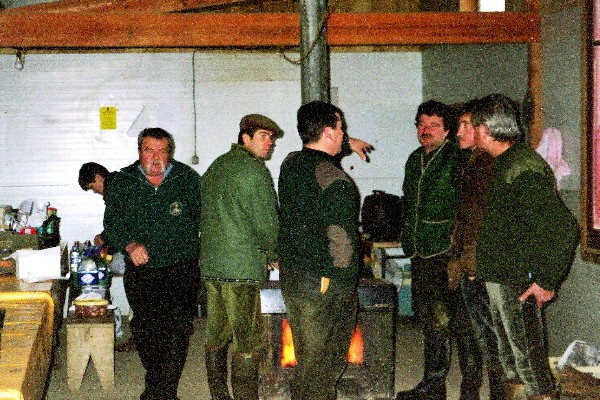 |
| The
hunters gather. The former bistro owner(left)takes care of the first order of
business--eating. |
After Max's third phone call, I said,
"Tell him I'll go, but only if
it doesn't
rain."Then I began to hope for rain.
It was raining on Thursday. "This might
work out okay," I said to
myself. But
when I got up early Friday morning the
rain had stopped
and the sky was
clearing. I let out a sigh of resignation.
Max arrived at 8:15. I'd asked if I
should bring anything and he'd
replied,
"Yes, a bottle of wine." For a hunt?
Ah, la France. I
selected a better than
average Côte du
Rhône.
One of the hunters was waiting outside the gate in his small white panel
truck, which was full of dogs. Max and I were to follow him to the site of the
hunt, about 45 minutes away, to the west, in one of the poorest, prettiest, and
least populated areas of France. Although it is not generally known, since they
want to keep it a secret, this area--called La Creuse--has become popular with
French artists and movie stars, who are moving in to buy holiday homes from
farmers whose children are fleeing to the cities. The sun rose brilliantly,
spotlighting the unspoiled, hilly countryside.
After frequent turnoffs, during miles of snaking blacktop, we arrived at a
big metal gate, with a sign saying "Private Hunting Park." The gate was unlocked
and we entered and turned onto a muddy track of a road. It was an area of what
the French call "petit bois"--small trees, often scraggly, with a secondary
growth of high brambles and bush.
The "park" was 45 hectares (112 acres), and owned by the mayor of a small
village not far away. For 1500 francs (about $250) hunters could rent the
reserve for the whole day. An additional charge would be made for any game
killed. We quickly reached a white hunting lodge. Inside on the left was a rusty
old fridge; on the other end, a gas stove. In the middle of the room was a
wood-burning stove. The place was without running water.
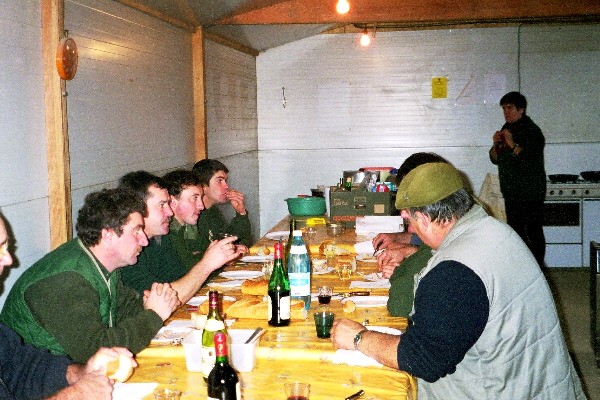 |
| At ten a.m. we
began to eat. And drink. And I started
worrying about how safe this hunt was
going to be. |
Several hunters were already there.
Greetings were exchanged.
"Ça va?"
"Oui. Ça va. Ça va?"
And one of them immediately opened a bottle of white wine.
Not wanting to appear unsociable, I accepted a glass.
At nine in the morning, let me assure you, a glass of wine calls attention to
itself, especially after only a half-bowl of cereal for breakfast.
Soon the other hunters arrived in panel trucks, like our guide, whose hauling
space had been converted into dog cages. The dogs were left in the trucks to
snarl at each other, while we went inside to sit at a long table with wooden
benches on either side. A former bistro owner, a big fat jolly man with a bushy
mustache, and his wife, a husky woman with dyed short brown hair, arrived in a
car loaded with food, water, bread, wine, whiskey--and a bottle of gas to hook
up to the stove. They had been hired to do the cooking.
"We won't be back here for lunch," Max said. "You'd better eat well."
"Jeez!" I said. "At ten a.m.?"
Wine was opened and passed around. The first course arrived, a fillet of
mackerel cooked in white wine and spices. Then came a homemade pâté. After that
a sizzling omelette with bits of bacon. All of it served with plenty of freshly
baked country bread.
As the wine began to flow, Max, who was sitting across from me, loudly
announced to the table: "Zalin is the best writer in America."
"Max, Max," I said.
"Well then, one of the five best," Max said.
"My friend Max exaggerates," I said to the group. They laughed genially,
having already, I suspect, figured this out.
There were seven hunters, plus me and Max as guests, and the two cooks. The
hunters were mostly in their mid or late thirties. Except for one--who was
overweight and worked in the post office--they were slim and rather handsome,
longtime friends who owned small businesses ranging from bricklaying to a
bakery. One of them was a taxidermist, around six-two, with long brown hair and
a pleasant, joking personality. In the hierarchy of hunters, he was second to
the quiet-spoken Guy, Max's close friend, to whom all of them subtly
deferred.
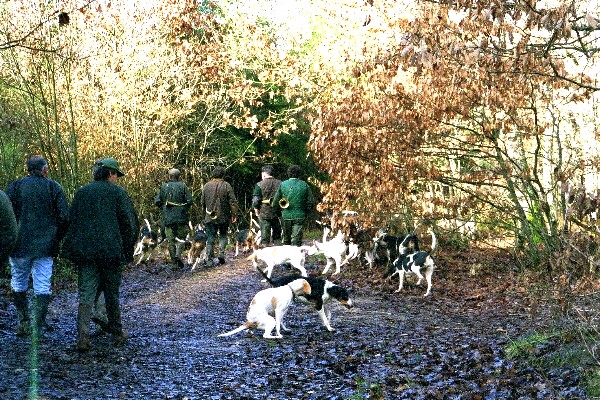 |
| At 10:40 a.m. we
moved out. To my relief and astonishment this was to be a hunt without
guns. |
It was clear to me that I was with men who had a deep respect for
the traditions of hunting and protecting the environment.
For them hunting was not a macho status symbol, as it appeared to be
for so many of the hunters from the big cities that I had run into.
They loved everything about hunting. This was obvious by their every
word and gesture.
As one of them said to me, "We are really the last of the breed. It will be
over in a few years, because the younger generation isn't interested in
hunting."
So I had no qualms about being with men like this. I did have a few qualms,
however, about going hunting with guys who had drunk so much wine before noon.
Would they accidentally shoot me?
To my relief, not to mention astonishment, I learned that this was to be a
hunt without guns. Only knives would be used. A total of 40 dogs would be in
play and if they cornered a wild boar the hunters would move in to slit the
boar's throat. Now this was sportingly dangerous, because the boar will attack
when threatened, and has been known to kill. I was impressed and regretted my
misplaced thoughts about mixing wine and guns. Since there was no chance of
being shot accidentally, we would be able to move up and down the road,
following the dogs in the bush as they made the chase.
At 10:40 a.m. we moved out with the yelping dogs. The real hunters, six of
the seven men, entered the bush with the dogs, while Max and I and the fat one
kept to the road. We must have walked back and forth ten times during the hunt,
a total of ten kilometers, six miles.
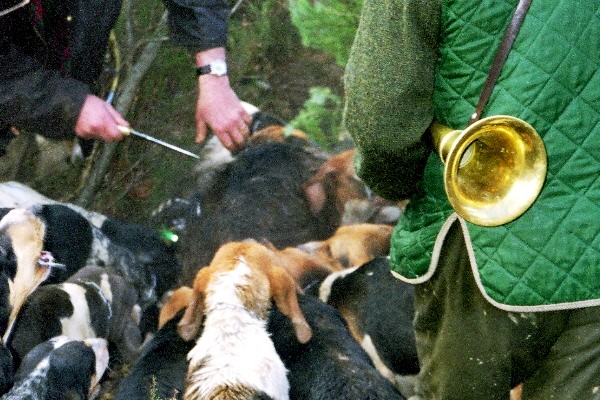 |
| The kill is made with a quick stab. Having fallen
down like a klutz, I arrived too late to get other shots. |
I was pulling for the boar. And to my surprise they proved smarter
than the dogs.
The wild pigs would run in a circle, then cut back and forth, and
the dogs, which knew only how to follow a scent, would take
no shortcuts and the boar would finally lose them.
Then the hunters would drive the dogs to another location and the
chase would begin anew
At one point a boar crossed the road very close to me, pushing my
adrenaline into the red zone. He was the king of the chase--a
big black brute who looked dangerous as hell and ran with
unbelievable speed. I tried to take a photo as he thundered by, but he
was too fast for my shaky hands.
Saying a Prayer
I look at my watch. One o'clock. I am tired of the whole thing. I want to go
home. When I ask Max what time it will end, he says, "Oh this will last till
nightfall."
"Nightfall! Ohmigod, what have I got myself into?"
The owner of the game reserve, the mayor, is walking with us. His mobile
phone chimes and he begins to talk to someone who wants to rent a cafe in his
village--talks for a half an hour, all of which I can unavoidably overhear.
Nothing irritates me more than to be forced to listen to people yakking on a
mobile phone, to be reminded that eighty-three percent of all human conversation
consists of inanities and banalities. Thank you for not sharing, is what I want
to say to them.
It begins to rain. Maybe it will rain so hard they will give up, I hope. But
it soon stops.
I am miserable--tired, cold, wet, my lower back hurts. My attitude undergoes
a change: I become bloodthirsty. Maybe if they get a boar we'll stop and go
home. Damn boars! They're the cause of my misery!
Suddenly, at 1:50 p.m., the yelping of the dogs grows to thunderous
proportions. Two hunters happen to be nearby and they motion for me to follow
them down a sidetrack. We can hear the big black boar being chased. But he gets
away.
Then just as suddenly it appears that the dogs have surrounded another boar.
The hunters tell me to follow them, and I head into the bush behind them. But
I'm unable to keep up. A tall bramble bush slaps me on the forehead, knocking me
on my rear end, like some klutzy city guy. I scramble up, looking around in
embarrassment to determine if anybody saw.
Forty snapping, snarling dogs have a gray-black boar surrounded twenty meters
away. In theory, the dogs are supposed to surround but not to kill. Since these
dogs belong to a number of different hunters, discipline has broken down, and
they are closing in.
The boar squeals. It is not the sound of a savage wild beast but the sound of
a pig that is about to die, a sound I've heard before when a domesticated pig
was being butchered in an abbattoir. Later, one of the hunters remarks that the
plaintive pig squeal jarred him too. The big black brute would have been
snorting and fighting for his life.
The hunters are waiting for me to arrive to take photos. One of them wades
into the pack and beats the dogs back away from the boar with his whip. As soon
as I get there, the hunter unsheaths his long knife and dispatches the boar with
a swift stab to the neck. The boar instantly falls dead .
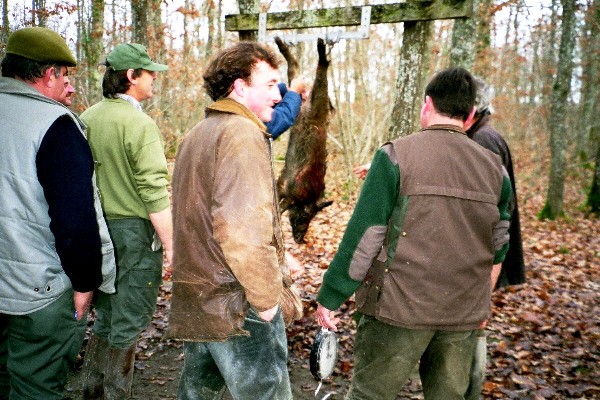 |
| None of the hunters wants to clean and prepare the boar. But my friend
Max steps up to do the job. |
My camera runs out of film. It takes me several minutes to reload.
They beat the dogs back from around the dead boar.
The other hunters arrive. I finally get my camera set. I can imagine
that the shots I'm taking might turn off some people from hunting
forever.
This ends the hunt. The hunters are happy. Four of them carry the
boar out of the bush, and we walk back to the lodge. It is
exactly two p.m. I'm happy too. Maybe this is the last of it and I
can go home.
When we get to the lodge they sling the boar up. He weighs 35 kilos, 77
pounds, not so big but not so small either, yet nothing like the big black brute
that outsmarted all the dogs. There is a moment of hesitation. Who is going to
do the butchering? The hunters back away. They want nothing to do with it.
Max steps up. Yes, Max, the jack of all trades, is also a butcher. His friend
Guy helps him, and they clean and prepare the boar in twenty minutes. The other
hunters hasten into the lodge and take seats at the table.
Everybody is in high spirits. The hunt has been a success. The two cooks
bring whiskey and pastis and slices of saucisson. Refills are quickly demanded.
I nurse a small glass of red wine, as I do for the rest of the afternoon,
because I feel something of a stranger in this strange land.
The hunters are happy for me for, by chance, I happened to be nearby when the
kill took place and was able to get some rare photos. If the kill had taken
place just a few meters away in the thick bush, I would have missed it.
At four p.m., after much talk and drink, food is served. When the first dish
arrives, Max loudly says, "Oh Zalin won't eat that." Then he describes the dish
and its provenance in great clinical detail.
It is thin slices of calf stomach (fraise de veau), entwined like a bowl of
pasta, served with a mustard and herb vinaigrette sauce. Well, I'll eat anything
since I'm a guest. And in fact I find it quite tasty--if only Max hadn't told me
what it was! My policy for food, as a guest, developed years ago in Southeast
Asia, is don't ask, don't tell.
The main course moves into more familiar territory--duck breast served with
diced potatoes and garnished by cèpe mushrooms. It is delicious and I ask for
seconds.
Max pays the mayor/owner for the boar, 600 francs, about $100. After much
revelry and talk, I ask Max if we can leave. After we finish coffee, he says.
Even though the hunters are reluctant to accept, I insist that I chip in 100
francs to cover my share of the food.
Finally after dark we say our good-byes and shake hands all around. Max
doesn't know the way home, so we follow his friend. Both of them, full of pastis
and whiskey and wine, drive like demons. It takes us 30 minutes in the dark to
return, whereas it took us 45 minutes in the light of morning to arrive. I am
never so happy as when I see the outlines of Panou's village in the
distance.
As I slide out I thank Max for a day to remember. Watching his tail-lights
fade, I give further thanks to keep a promise I'd made during the hunt.
"Thank you, God, for getting me through that. I'll never go hunting
again."
A week later Max stops by for lunch. I give him copies of the photos I took,
to distribute to the hunters, with my thanks.
"Hunters can't be fooled," Max says. "They don't say much but they are
sensitive to a guy's vibrations--and they like you very much. They think you've
got the right attitude for a hunter. And they want to invite you to another
hunt, this time with shotguns."
"Uh, Max," I say. "Tell them I really appreciate it. But I think I'm
scheduled to be somewhere far, far away--like Timbuktu." |